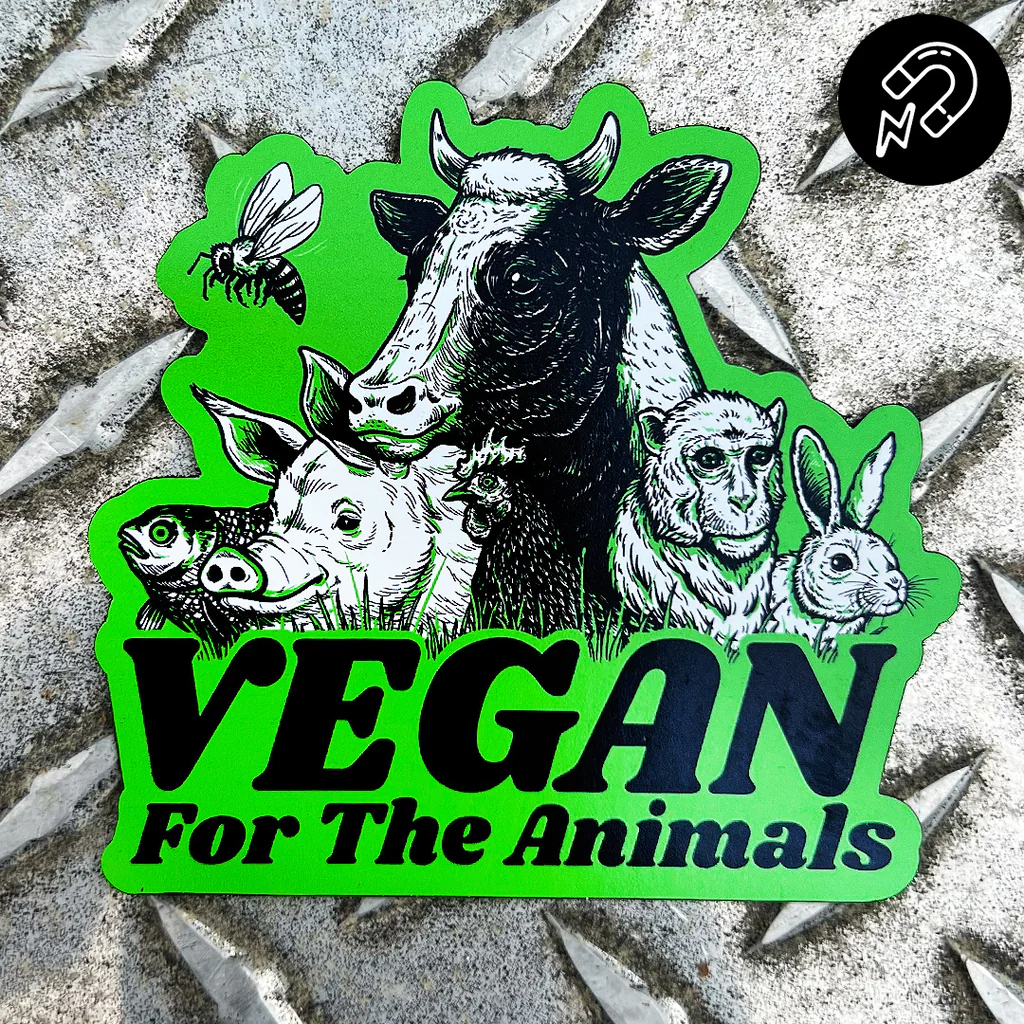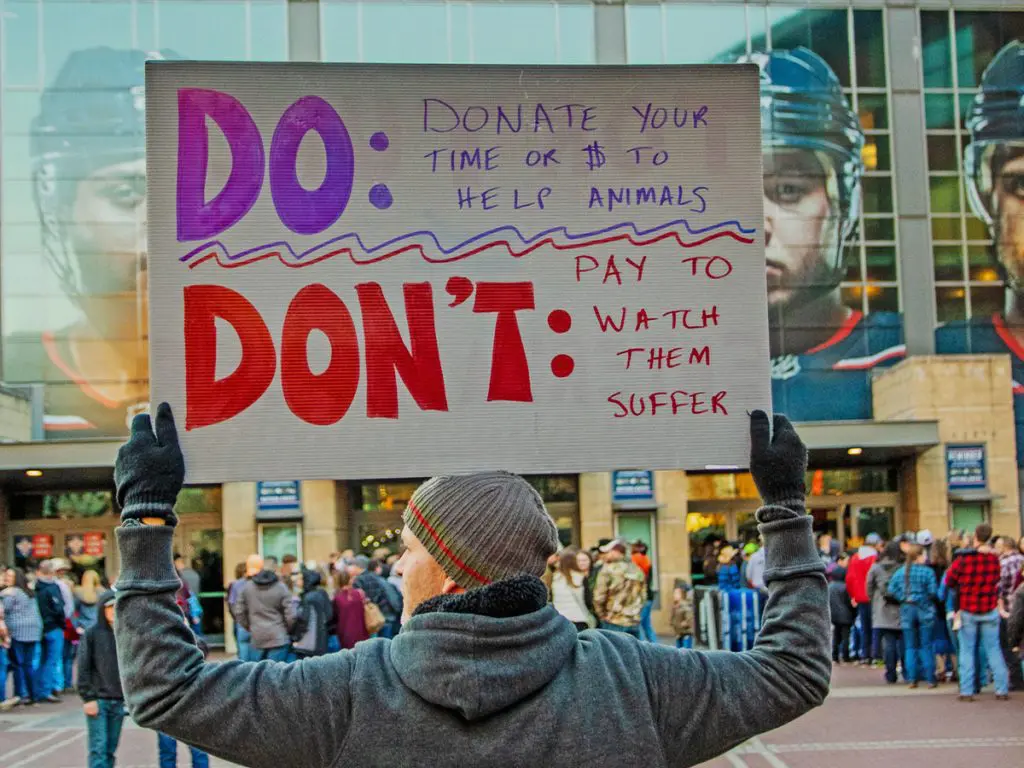Veganismus, e Liewensstil baséiert op der Vermeidung vun all Déiereprodukter, huet an de leschte Joeren Traktioun gewonnen als Diätwahl aus gesondheetlechen an Ëmweltsgrënn. Wéi och ëmmer, fir vill Individuen ass Veganismus méi wéi nëmmen eng Diät - et ass eng Bewegung Richtung Déierebefreiung. D'Prinzipien vum Veganismus verlängeren wäit iwwer just dat wat verbraucht gëtt; et ëmfaasst eng Philosophie vu Matgefill, Ethik, an Aktivismus. D'Bewegung huet Dynamik gewinnt wéi méi Leit sech bewosst sinn iwwer den zerstéierende Impakt vun der Déierelandwirtschaft op d'Ëmwelt, Déiereschutz a mënschlech Gesondheet. Veganismus ass net nëmmen eng perséinlech Wiel, mee eng mächteg Ausso géint d'Ausbeutung an d'Leed vun Déieren. An dësem Artikel wäerte mir an d'Wuerzelen vum Veganismus verdéiwen an entdecken wéi et sech zu enger Bewegung fir Déierebefreiung entwéckelt huet, déi Schlësselspiller, Organisatiounen an Eventer ervirhiewen déi säi Fortschrëtt geformt hunn. Mir wäerten och d'Kontrovers ronderëm Veganismus ënnersichen an hiren Impakt op Individuen, Gemeinschaften a global Themen. Maacht mat wéi mir déi dynamesch an ëmmer wuessend Welt vum Veganismus an de Kampf fir Déierebefreiung entdecken.
Matgefill ëmfaassen: de vegan Liewensstil
Veganismus, méi wéi nëmmen eng Diätwahl, ass e Liewensart a Matgefill an etheschen Iwwerleeungen. Andeems se e vegane Liewensstil ëmfaassen, weisen Individuen aktiv hiren Engagement fir Déiereschutz an de Kampf géint Déiereexploitatioun. Dëst beinhalt d'Ofhale vun Déiereprodukter ze konsuméieren, wéi Fleesch, Molkerei, Eeër an Hunneg, souwéi d'Vermeidung vu Produkter ofgeleet vun Déieretest oder Ausbeutung, wéi Pelz, Lieder a Kosmetik op Déieren getest. D'Entscheedung fir e vegane Liewensstil ze adoptéieren geet iwwer perséinlech Gesondheetsvirdeeler eraus, well et den inherente Wäert a Rechter vun all Liewewiesen unerkennt, a probéiert eng méi human an nohalteg Zukunft ze förderen. Duerch bewosst Choixen an hirer Ernährung a Konsumgewunnechten spillen Veganer eng vital Roll fir déi existent Systemer erauszefuerderen, déi d'Leed vun den Déieren daueren an de Wee fir eng méi sympathesch Gesellschaft ausbauen.

Iwwert Iessen: ethesch Veganismusbewegung
Déi ethesch Veganismusbewegung erweidert sech iwwer d'Räich vum Liewensmëttelverbrauch, a ëmfaasst eng Rei vu sozialen, ökologeschen an etheschen Iwwerleeungen. Affekote vum ethesche Veganismus erkennen datt d'Ausbeutung an d'Mëssbehandlung vun Déieren wäit iwwer hir Notzung als Liewensmëttelquell eraussträichen. Andeems Dir Produkter ofleent, déi aus Déierequälerei ofgeleet ginn, wéi Kleeder aus Pelz oder Lieder, a Kosmetik op Déieren getest, ënnerstëtzen ethesch Veganer aktiv eng méi sympathesch an nohalteg Welt. Dës Bewegung probéiert d'Gesellschaftsnormen a Praktiken erauszefuerderen, déi Déiereleeden behalen, fir Déiererechter plädéieren an alternativ Léisungen förderen, déi Empathie, Gewaltlosegkeet a Respekt fir all Liewewiesen prioritär stellen. Duerch hir Choixen an Handlungen förderen ethesch Veganer Sensibiliséierung, Erzéiung an Aktivismus, féieren bedeitend Ännerungen an Industrien a Politiken fir eng méi gerecht a sympathesch Gesellschaft fir Mënschen an Déieren ze kreéieren.
All Liewen schützen: Déierebefreiung
D'Befreiung vun Déieren ass eng mächteg an dréngend Bewegung, déi versicht all Liewensform vun onnéideger Leed an Ausbeutung ze schützen. Et geet iwwer d'Grenze vum Veganismus als Diät eraus an ëmfaasst eng méi breet Philosophie, déi a Matgefill a Gerechtegkeet verwuerzelt ass. Déi dreiwend Kraaft hannert dëser Bewegung ass d'Unerkennung datt Déieren sentient Wesen sinn, fäeg Péng, Genoss an eng Rei vun Emotiounen ze erliewen. All Liewen schützen heescht fir d'Enn vun der Déiereexploitatioun a verschiddenen Industrien ze plädéieren, wéi Ënnerhalung, Moud a Fuerschung. Et ëmfaasst Kampf géint Praktiken wéi Fabréck Landwirtschaft, Déier Testen, an d'Begrenzung vun Déieren fir mënschlech Ënnerhalung. D'Zil vun der Déierebefreiung ass eng Welt ze kreéieren wou Déieren hir inherent Rechter ginn, fräi vu Schued ze liewen a mat Dignitéit a Respekt behandelt ze ginn. Duerch aktiv Ënnerstëtzung vun der Déierebefreiung droe mir zu enger méi sympathescher an ethescher Gesellschaft bäi, wou d'Wuelbefannen vun alle Liewewiesen geschätzt a geschützt ass.
Den Ëmweltimpakt vum Veganismus
Veganismus huet bedeitend Opmierksamkeet gewonnen net nëmme fir säin Impakt op Déiereschutz, awer och fir seng potenziell positiv Auswierkungen op d'Ëmwelt. D'Adoptioun vun engem vegan Liewensstil ass gewisen datt d'Kuelestoffemissiounen, d'Waasserverbrauch an d'Landdegradatioun wesentlech reduzéieren, verbonne mat der Produktioun vun Déier-baséiert Liewensmëttel. D'Produktioun vu pflanzenbaséierten Alternativen erfuerdert manner Ressourcen, wéi Land, Waasser an Energie, wat et e méi nohaltege Choix mécht. Zousätzlech kann d'Eliminatioun vun der Déierelandwirtschaft hëllefen d'Entbëschung ze reduzéieren, well grouss Flächen vum Land fir Béischten a Fudderproduktioun geläscht ginn. Andeems de Veganismus ëmgeet, droen d'Individuen zum Erhaalung vun den natierleche Ressourcen bäi a spillen eng entscheedend Roll bei der Bekämpfung vum Klimawandel an der Promotioun vun enger méi nohalteger Zukunft.
Stand fir sozial Gerechtegkeet: Veganismus
Et kann een d'Intersektionalitéit vum Veganismus mat soziale Gerechtegkeetsbewegungen net iwwersinn. Veganismus alignéiert mat de Prinzipien vu Gläichheet, Gerechtegkeet a Gerechtegkeet, well et probéiert d'Ausbeutung an d'Ënnerdréckung vun Déieren erauszefuerderen. Sou wéi sozial Gerechtegkeetsbeweegunge sech fir eng fair a gläichbehandlung vun all Eenzelne striewen, erweidert de Veganismus dës Philosophie op net-mënschlech Déieren. Andeems se sech vum Konsum vun Déiereprodukter ofhalen, refuséieren d'Individuen d'Kommodifikatioun an d'Objektéierung vun Déieren, an erkennen hiren inherente Wäert an d'Recht fir fräi vu Schued ze liewen. Veganismus fördert eng méi sympathesch an inklusiv Gesellschaft, wou d'Interessen an d'Rechter vun alle Wesen, onofhängeg vun der Art, respektéiert a geschützt sinn. Ausserdeem fuerdert et déi dominant narrativ eraus, déi Speziesismus perpetuéiert an d'Hierarchie verstäerkt baséiert op arbiträren Ënnerscheeder. Dofir ass de Veganismus net nëmmen eng Diätwahl, mee e wesentleche Bestanddeel vum Gesamtkampf fir sozial Gerechtegkeet an d'Befreiung vun alle sentienten Wesen.

Mythen iwwer Veganismus verdreiwen
Veganismus ass an de leschte Joeren ëmmer méi populär ginn, awer mat senger Erhéijung vun der Popularitéit si vill Mythen a Mëssverständnis opgedaucht. Et ass essentiell dës Mythen ze verdreiwen a Liicht op d'Realitéit vum Veganismus ze werfen. Ee gemeinsame Mëssverständnis ass datt eng vegan Ernährung wesentlech Nährstoffer feelt. Wéi och ëmmer, mat enger korrekter Planung an Ausbildung, kann eng gutt equilibréiert vegan Ernährung all déi néideg Nährstoffer fir eng optimal Gesondheet ubidden. En anere Mythos ass datt Veganismus deier ass, awer a Wierklechkeet kann eng Planzbaséiert Ernährung bezuelbar sinn, besonnesch wann Dir op ganz Liewensmëttel a saisonal Produkter fokusséiert. Zousätzlech gëtt et e Glawen datt Veganismus restriktiv ass a Liewensmëtteloptiounen limitéiert, awer d'Wourecht ass datt et eng Onmass lecker a divers Planzbaséiert Alternativen verfügbar ass, wat de Veganismus e versatile an agreabele Liewensstilwahl mécht. Andeems Dir dës Mëssverständnis erausfuerdert, kënne mir e bessert Verständnis vum Veganismus als eng sympathesch an nohalteg Bewegung fir Déierebefreiung encouragéieren.
All Dag en Ënnerscheed maachen
All Dag bitt eis Méiglechkeeten en Ënnerscheed ze maachen, an de Veganismus ëmzegoen ass ee mächtege Wee fir dat ze maachen. Andeems mir e pflanzenbaséierte Liewensstil auswielen, bedeelegen mir eis aktiv un de Kampf fir d'Befreiung vun Déieren an droen zu enger méi sympathescher an nohalteger Welt bäi. All Molzecht, déi mir ouni Déiereprodukter konsuméieren, hëlleft d'Nofro fir d'Fabrécklandwirtschaft a seng verbonne Grausamkeet ze reduzéieren. Et erlaabt eis e Stand géint d'Ausbeutung vun Déieren fir Liewensmëttel, Kleeder an aner Zwecker ze huelen. Ausserdeem ënnerstëtzt d'Adoptioun vun engem vegan Liewensstil ëmweltfrëndlech Nohaltegkeet andeems d'Treibhausgasemissiounen, d'Entbëschung a Waasserverschmotzung reduzéiert ginn. Andeems mir all Dag bewosst Choixe maachen, kënne mir e Ripple-Effekt vu positiver Verännerung erstellen an Deel vun enger Bewegung sinn, déi probéiert eng méi gerecht a matgefillend Welt fir all Wesen ze kreéieren.
Opgepasst Konsum fir eng besser Welt
An der haiteger interkonnektéierter Welt huet d'Konzept vum bewosst Konsum bedeitend Traktioun gewonnen wéi Individuen e positiven Impakt op de Planéit a seng Awunner sichen. Bewosst Konsum geet doriwwer eraus einfach ëmweltfrëndlech Produkter ze wielen an erstreckt sech op d'Ethik an d'Nohaltegkeet vun eise Kaafentscheedungen. Andeems mir bewosst sinn iwwer d'Origine vun de Produkter déi mir kafen, kënne mir Firmen ënnerstëtzen, déi Fairtrade Praktiken prioritär stellen, Offall reduzéieren an hire Kuelestoffofdrock minimiséieren. Et handelt sech ëm Froen iwwer d'Materialien, déi benotzt ginn, d'Aarbechtsbedingunge, an den allgemengen Impakt op d'Ëmwelt ze stellen. Andeems mir opmierksam Konsuméiere kënnen, kënne mir eis Wäerter mat eisen Handlungen ausriichten an zu der Schafung vun enger besserer Welt fir zukünfteg Generatiounen bäidroen.
Empowering Choixe fir Déiererechter
D'Bewegung Richtung Déiererechter gewënnt Momentum wéi d'Individuen ëmmer méi bewosst ginn iwwer d'ethesch Implikatioune vun hire Choixen. Empowering Choixe fir Déiererechter geet doriwwer eraus einfach Ofhalen vun Déiereprodukter ze konsuméieren; et ëmfaasst e méi breeden Engagement fir d'Wuelbefannen an d'Befreiung vun alle sentienten Wesen ze plädéieren. Dëst kann erreecht ginn duerch d'Ënnerstëtzung vu Grausamkeet-gratis Marken, un der Basisaktivitéit deelzehuelen, an anerer iwwer d'Auswierkunge vun der Déierelandwirtschaft op d'Ëmwelt an d'Déiereschutz z'educéieren. Andeems mir bewosst Entscheedungen treffen, déi mat de Prinzipien vu Matgefill a Gerechtegkeet ausriichten, kënne mir zum Kampf fir Déierebefreiung bäidroen an eng méi sympathesch Gesellschaft kreéieren.
















































